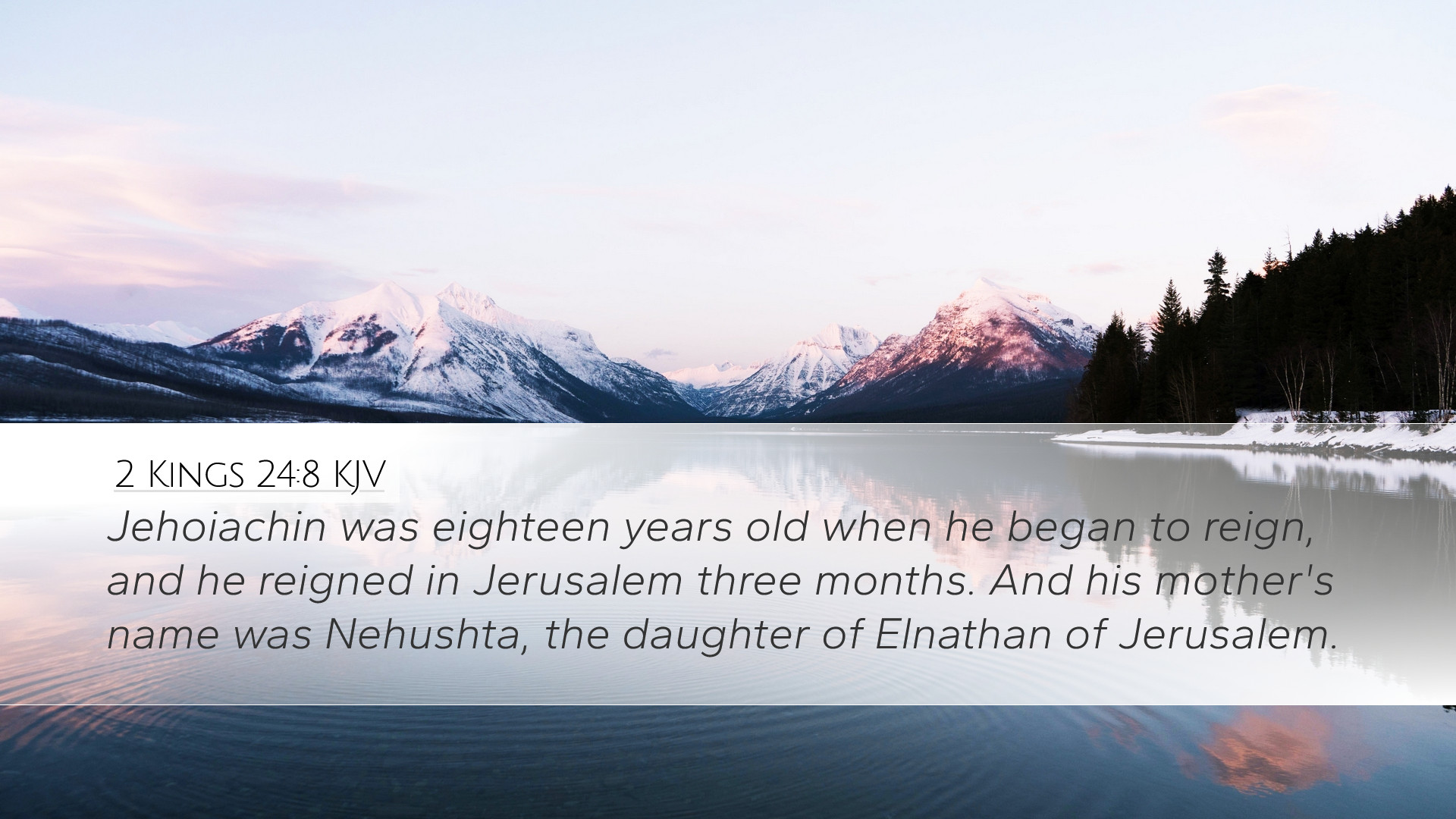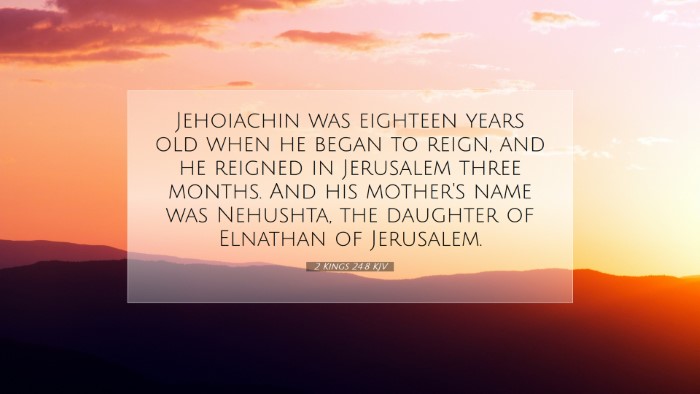Old Testament
Genesis Exodus Leviticus Numbers Deuteronomy Joshua Judges Ruth 1 Samuel 2 Samuel 1 Kings 2 Kings 1 Chronicles 2 Chronicles Ezra Nehemiah Esther Job Psalms Proverbs Ecclesiastes Song of Solomon Isaiah Jeremiah Lamentations Ezekiel Daniel Hosea Joel Amos Obadiah Jonah Micah Nahum Habakkuk Zephaniah Haggai Zechariah Malachi2 Kings 24:8
2 Kings 24:8 KJV
Jehoiachin was eighteen years old when he began to reign, and he reigned in Jerusalem three months. And his mother's name was Nehushta, the daughter of Elnathan of Jerusalem.
2 Kings 24:8 Bible Commentary
Commentary on 2 Kings 24:8
Verse: "Jehoiachin was eighteen years old when he became king, and he reigned in Jerusalem three months. His mother's name was Nehushta daughter of Elnathan. She was from Jerusalem." (2 Kings 24:8, NIV)
Introduction
This passage introduces a pivotal moment in the history of Judah, marking the brief reign of King Jehoiachin. Commentaries from renowned theologians such as Matthew Henry, Albert Barnes, and Adam Clarke provide valuable insights into the implications of this verse, reflecting on the political, spiritual, and historical contexts surrounding Jehoiachin’s short tenure as king.
Historical Context
Matthew Henry points out that the period of Jehoiachin's reign was marked by instability and conflict. The nation of Judah was besieged by Nebuchadnezzar, king of Babylon, which highlights the vulnerability of the kingdom at this time. His short reign of merely three months reflects the turbulent political landscape that characterized this era, where regimes often changed due to external pressures and internal strife.
Albert Barnes elaborates on the significance of Jehoiachin's age—only eighteen years old when he ascended the throne. This detail underscores the precarious nature of leadership in a nation that had strayed from God, and it prompts a reflection on the maturity and wisdom required for governance, which Jehoiachin lacked, given his youth and inexperience in the face of crises.
Spiritual Insights
Adam Clarke emphasizes the moral and spiritual decline of Judah during Jehoiachin's reign. Although his mother, Nehushta, is mentioned, her influence is not portrayed positively in the commentaries, suggesting that maternal guidance might not have aligned with righteousness. The kingdom's fate was, therefore, a reflection of its leaders, both politically and spiritually.
Henry identifies the biblical theme of divine judgment manifesting through the leadership failures of kings. Jehoiachin's rule serves as a cautionary tale of how the failure to uphold godliness can lead to national disaster. As king, he should have sought God's favor but instead continued in the destructive paths established by previous rulers, contributing to the path toward exile that would soon follow.
Theological Reflections
This verse serves as a narrative hinge in the text of the Kings, revealing the crucial transition between the last kings of Judah and the impending Babylonian exile, a major theological theme in the Old Testament.
- God's Sovereignty: The span of Jehoiachin’s reign illustrates the overarching sovereignty of God, who uses even the failures of human leaders to fulfill His divine purposes.
- Consequences of Sin: The brief reign is a manifestation of the consequences of sin, where the judgment of God is evident, and illustrates how a nation can be led away from godliness.
- Hope in Judgment: Despite the dire circumstances, the commentaries suggest that even amidst judgment, there exists a glimmer of hope for restoration and a future Messiah, anchoring the theological narrative of hope for redemption through a lineage that will ultimately lead to Christ.
Conclusion
Final Observations: Jehoiachin's reign, albeit short-lived, is dense with implications for understanding the history of Judah’s kings and the theological trajectories within the biblical text. Through the insights drawn from the commentaries, we discern the critical lessons of leadership, the dire consequences of neglecting divine counsel, and the hope that persists even in the darkest times.
As we reflect on 2 Kings 24:8, let it compel those in leadership and scholars alike to seek righteousness and godly wisdom in their own lives and communities. The legacies left by past leaders are reminders of the power and responsibility that accompany authority.


